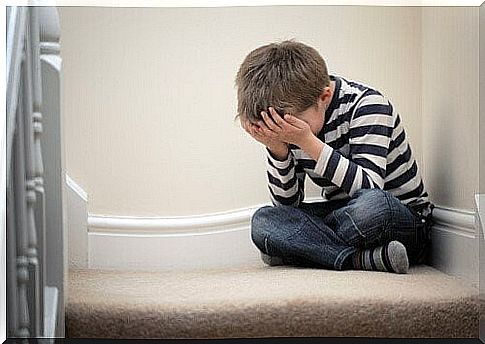This Is How You Deal With Children’s Fear!

Most people believe that children are always happy and worry-free. But that’s not true. Children’s fear is a key issue.
Statistics show that up to 20% of all children suffer from some type of anxiety.
What Causes Childhood Fear?
A child’s fear can have various causes. Because of this, it is useful to have at least some basic knowledge of the topic.
Guardians should give children all means available to help them learn to manage their emotions.
The causes of children’s anxiety also depend on age. Here are some of the most common reasons:
- Physical or psychological abuse.
- Conflicts between parents.
- One parent suddenly disappears.
- Traumatic experiences of all kinds.
- Financial hardship.
- Too much responsibility.
- Sudden changes in the child’s life, such as moving house, the birth of a sibling or the death of a family member.
- A lack of structure in everyday life. This also includes a constant change of sleeping and eating times.

- Lack of contact with one or the other parent.
- Unpleasant situations at school.
- The lack of clearly identifiable boundaries.
- Not enough physical activity.
- Excessive consumption of sugar.
- Exhaustion or tiredness due to various activities during the day.
- Lack of self-confidence or self-esteem.
- Fear of a separation of the parents.
Parents or other responsible persons need to recognize these causes. In addition, it is up to them to find a solution for this.
Fear of children – this is how we can help
1. Avoid guilt
Parents often feel anxious themselves when their children suffer from this condition. That may sound ironic, but it really is. Some parents feel guilty too.
Guilt doesn’t help anyone and that’s why it’s best to avoid this feeling. Acting under the influence of guilt can lead to bad decisions. It is therefore important to distinguish between responsibility and guilt. Only then can necessary measures be taken.
2. Have conversations
This may be obvious advice, but not all parents take it out. It is important that a child can be heard. Parents need to listen carefully to understand how their own child is feeling.
Parents should create a bond that makes their children feel like they are free to express themselves.
“Anyone caring for a child should provide them with appropriate means to express their feelings in a healthy way.”
3. Be a role model
Children watch their parents and imitate their behavior. This also applies to dealing with emotions and problems. That is why we should be aware of our role model. We should deal with stress the way we want our children to deal with it.
4. Diet
Excessive consumption of sugar can affect a child’s behavior. Children have a lot of energy one way or another. If you eat more sugar than your body can handle, you lose control.

5. Don’t ask too much
Parents should know that their children are not perfect. It is important for children to know that despite the mistakes they make, they are loved.
Being too demanding can create a lot of stress for a child. A typical example of this is the school performance of children. Here parents often put too much pressure on.
This can also be the case in sports. Children who believe they need to be perfect and perform at their best are more likely to suffer from fear.
Fear of children – love always helps!
6. love
How can we help children deal with stressful situations? First of all, they have to feel capable. That, in turn, is closely related to their self-confidence.
In order for a child to have a certain level of self-confidence, it must feel the unconditional love of the parents. Under no circumstances should parents express their love only if their children are successful. That sends the wrong message.
We must be devoted to our children at all times. We need to spend time with them so they know how much they mean to us.









